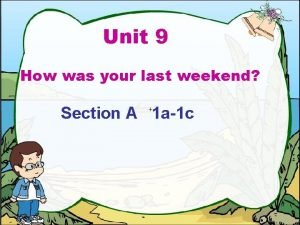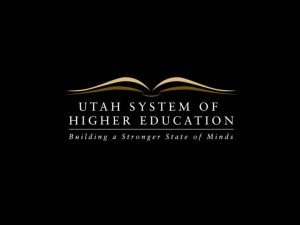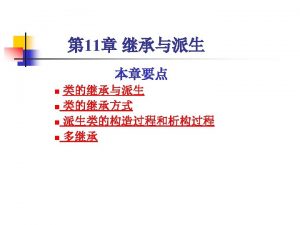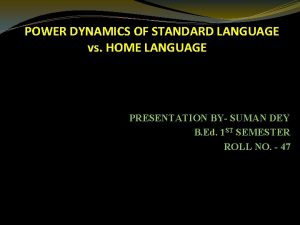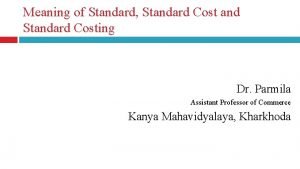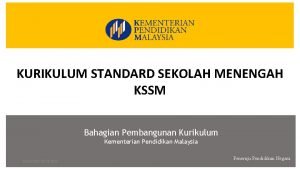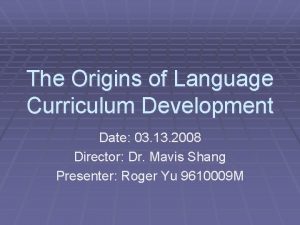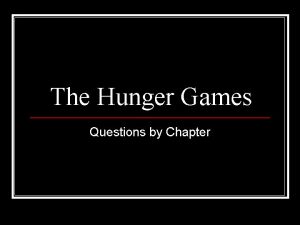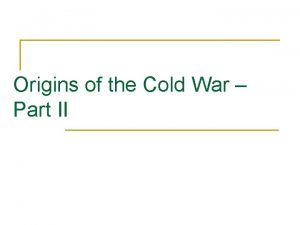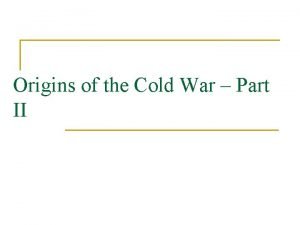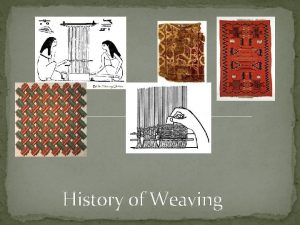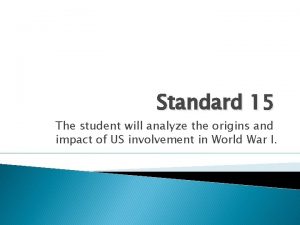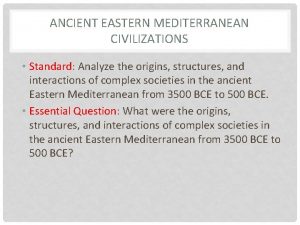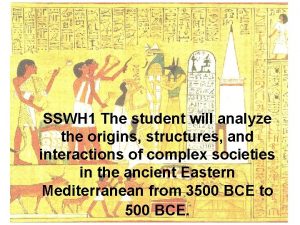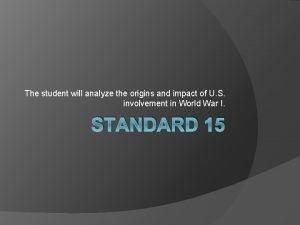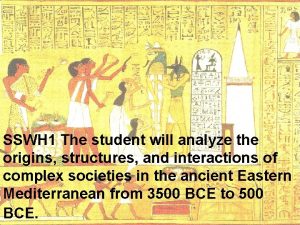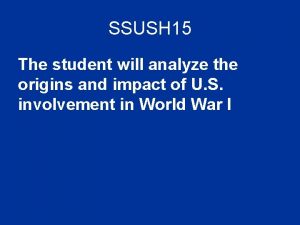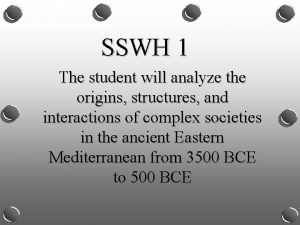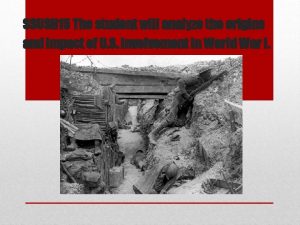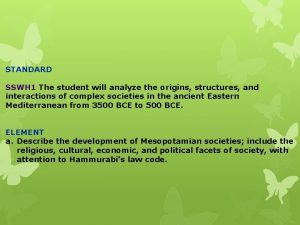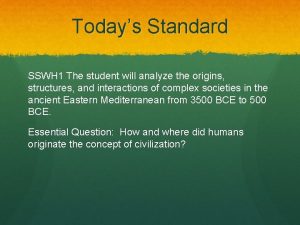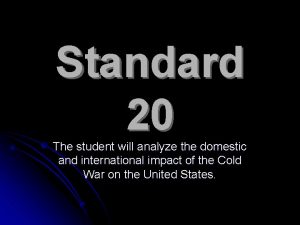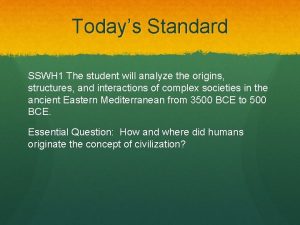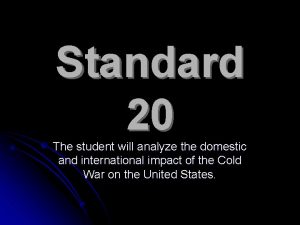Standard 15 The student will analyze the origins





















- Slides: 21

Standard 15 The student will analyze the origins and impact of US involvement in World War I.

A.

Causes of WWI � Imperialism � Militarism: preparing for war � Nationalism: colonies wanted independence � Public and Secret European Alliances

Alliances Central Powers: � Germany � Austria-Hungary � Ottoman Empire � Japan The Allies: � Russia � France � Serbia � Great Britain � United States of America

The Introduction of Modern Warfare � Machine guns � Hand grenades � Chemical warfare � Submarine warfare ◦ The Germans perfected the use of submarines during the war.

What was the American Reaction? � Most people identified with their old countries. � Many opposed the Central Powers particularly Kaiser Wilhelm, the ruler of Germany. � America remained neutral.

Lets Go For A Cruise � The Lusitania: British passenger boat sunk by a German U-boat. 128 of the 1200 dead passengers were Americans. � The Sussex ( 03 -24 -1916): after sinking the Sussex, the Germans pledged to warn before sinking. ◦ This is known as the Sussex Pledge. � February 1, 1917, Germans began unrestricted warfare again.

The Zimmerman Telegram � Germany sent a telegram to Mexico urging them to join the fight against the U. S. and in return Germany would ensure that Mexico would receive land that once belonged to them that the U. S. took. � The British intercepted the message and gave it to the U. S.

TO WAR! � April 6, 1917: President Wilson signs the declaration of war because of the Zimmerman Note.

B.

The Great Migration � The Great Migration was the movement of 1. 4 million African-Americans out of the Southern United States to the North, Midwest and West from 1910 to 1930. � African Americans migrated to escape racism and seek employment opportunities in industrial cities.

The Espionage Act � The basic idea was to stop citizens from spying or interfering with military actions during World War I. � The U. S. Supreme Court unanimously ruled the Act was constitutional in Schenck v. United States (1919). � Charles Schenck mailed letters to men who had been drafted for the war and told them not to serve. � The Supreme Court decided that the government had the right to silence free speech if there is a “clear and present danger” to the nation.

Eugene V. Debs � He was one of the most influential Socialists in America. � He received five nominations From the Socialist Party for president. � Debs was imprisoned after being arrested and convicted under the Espionage Act of 1917 during the First Red Scare for speaking against American involvement in World War I.

Socialism � Socialism refers to various theories of economic organization advocating public or direct worker ownership and administration of the means of production and allocation of resources, and a society characterized by equal access to resources for all individuals with a method of compensation based on the amount of labor expended. � Most socialists share the view that capitalism unfairly concentrates power and wealth among a small segment of society that controls capital and derives its wealth through exploitation, creates an unequal society, does not provide equal opportunities for everyone to maximize their potentialities and does not utilize technology and resources to their maximum potential nor in the interests of the public.

C.

Wilson’s Vision for Peace � Fourteen Point: a plan for keeping peace after the war by removing armaments, trade barriers and setting up self-determination (power to make decisions for one’s own future). � League of Nations: Wilson proposed an organization of nations to ensure peace and security for the nations involved. Congress rejected U. S. membership fearing that the U. S. could be dragged into foreign wars.

D.

Eighteenth Amendment � Prohibition, also known as The Noble Experiment, is the period from 1919 to 1933, during which the sale, manufacture, and transportation of alcohol for consumption were banned nationally as mandated in the Eighteenth Amendment to the United States Constitution. � Under substantial pressure from the temperance movement, the United States Senate proposed the Eighteenth Amendment. � On December 5, 1933, the ratification of the Twenty-first Amendment repealed the Eighteenth Amendment. ◦ The 18 th Amendment is the only amendment to be repelled.

Fighting the 18 th Amendment � Chicago became notorious as a haven for Prohibition dodgers during the time known as the Roaring Twenties. � Many of Chicago's most notorious gangsters, including Al Capone and his enemy Bugs Moran, made millions of dollars through illegal alcohol sales. ◦ By the end of the decade Capone controlled all 10, 000 speakeasies in Chicago and ruled the bootlegging business from Canada to Florida. � Numerous other crimes, including theft and murder, were directly linked to criminal activities in Chicago and elsewhere in violation of prohibition.

Nineteenth Amendment � The Nineteenth Amendment to the United States Constitution prohibits each state and the federal government from denying any citizen the right to vote because of that citizen's sex. ◦ This amendment officially allowed women the right to vote in elections. � It was ratified on August 18, 1920.

Unit 4 Book Questions � Pg. 654: 1 -9 698: 1 -10 728: 1 -8 766: 1 -9 798: 1 -8 842: 2 -4, 8, 9, and 11 878: 1 -9 1014: 1 -9
 Were you at the beach last weekend
Were you at the beach last weekend What did they do last weekend
What did they do last weekend National student clearinghouse student tracker
National student clearinghouse student tracker Class maths student student1 class student string name
Class maths student student1 class student string name National student clearinghouse student tracker
National student clearinghouse student tracker Student freckle. com
Student freckle. com Hello teacher good morning
Hello teacher good morning Sls reset password
Sls reset password Std error
Std error Power dynamics of the standard language
Power dynamics of the standard language Define standard cost
Define standard cost 6 aspirasi murid
6 aspirasi murid The origins of sociology
The origins of sociology Selection and gradation in language teaching
Selection and gradation in language teaching Origins of kefir
Origins of kefir The hunger games questions
The hunger games questions Historical origins of the health belief model
Historical origins of the health belief model Rastafarian origins
Rastafarian origins Origins cwv 101
Origins cwv 101 Origins of the cold war
Origins of the cold war Origins of the cold war
Origins of the cold war Origin of weaving
Origin of weaving
